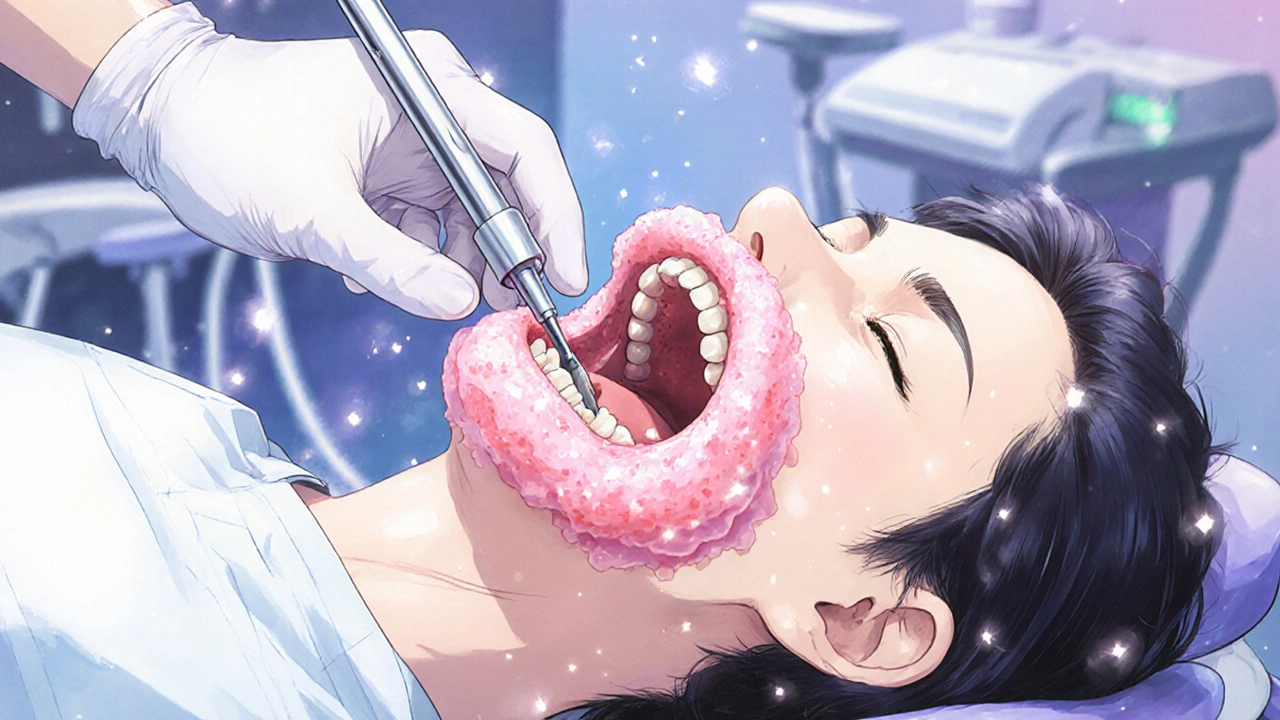Phenytoin and Dental Health: How to Prevent Gum Problems
 Oct, 28 2025
Oct, 28 2025
If you're taking phenytoin for seizures or nerve pain, you might not realize your gums are at risk. Up to 50% of people on long-term phenytoin develop swollen, overgrown gums-a condition called gingival hyperplasia. It’s not just cosmetic. These gums bleed easily, trap food, hurt when you eat, and can lead to infections or even tooth loss. The good news? You can stop it in its tracks with the right habits. You don’t have to accept sore, swollen gums as just another side effect.
Why Phenytoin Causes Gum Problems
Phenytoin doesn’t directly attack your gums. Instead, it messes with how your body handles bacteria and tissue growth. When you take phenytoin, your gums start reacting more strongly to plaque-the sticky film of bacteria that forms on teeth every day. Normally, your immune system keeps plaque in check. With phenytoin, that system goes into overdrive. The gum tissue starts growing extra cells, thickening and puffing out around your teeth.
This isn’t just about poor brushing. Even people who brush twice a day and floss can get it. That’s because phenytoin changes how your cells respond to the normal bacteria in your mouth. It’s like your gums think they’re under constant attack, so they keep building more tissue to protect themselves. The result? Gums that look like they’ve swollen over your teeth, making it harder to clean, and easier for bacteria to hide.
Signs You’re Developing Gum Overgrowth
Early signs are easy to miss. You might notice your gums feel tender when you brush. Or maybe your dentures don’t fit like they used to. As it gets worse, you’ll see visible changes:
- Gums that look puffy or bulbous around the front teeth
- Bleeding when brushing or flossing-even with gentle pressure
- Difficulty chewing because gums get in the way
- Bad breath that doesn’t go away with mouthwash
- Teeth that feel loose or shift position
If you’ve been on phenytoin for more than six months and notice any of these, don’t wait. The earlier you act, the easier it is to reverse.
Brushing and Flossing: The Non-Negotiables
Good oral hygiene isn’t optional when you’re on phenytoin. It’s your first line of defense. But you can’t just brush harder. You need to brush smarter.
Use a soft-bristled toothbrush and brush for two full minutes, twice a day. Angle the brush at 45 degrees where your gums meet your teeth. Use small circular motions, not back-and-forth scrubbing. Electric toothbrushes with pressure sensors work better-they stop if you’re pressing too hard, which helps prevent gum damage.
Flossing is even more critical. Plaque builds up between teeth where your brush can’t reach. If you struggle with regular floss, try a water flosser. Studies show water flossers remove up to 90% more plaque between teeth than string floss alone in people with gum overgrowth. Use it once a day, right after brushing.
Don’t skip days. Missing one day of flossing lets bacteria re-establish. And with phenytoin, those bacteria grow faster and trigger more tissue growth.

Professional Cleanings Every Three Months
Home care isn’t enough. You need professional help every three months-no exceptions. Most dentists recommend cleanings every six months. But if you’re on phenytoin, that’s too long. Plaque hardens into tartar in as little as 12 weeks. Once it’s there, you can’t remove it at home.
Ask your dentist for a periodontal cleaning. This isn’t just a polish. It’s deep scaling and root planing to remove tartar below the gumline. Some people need more frequent visits-every six to eight weeks-especially if gum overgrowth is already visible. Your dentist should check your gum depth, bleeding, and tissue growth at every visit.
Don’t delay. If you wait until your gums are severely overgrown, you might need surgery to remove the excess tissue. That’s expensive, painful, and doesn’t guarantee it won’t come back if you’re still on phenytoin.
Diet and Lifestyle Changes That Help
What you eat matters. Sugary foods and drinks feed the bacteria that cause plaque. Cut out soda, candy, and even fruit juices. Choose water, unsweetened tea, or milk instead.
Crunchy vegetables like carrots and celery act like natural toothbrushes. They help scrub plaque off while you chew. Eat them raw as snacks. Avoid sticky foods like dried fruit, caramel, or chewy breads-they cling to gums and stay there for hours.
Don’t smoke. Smoking reduces blood flow to your gums, making healing harder and overgrowth worse. If you use tobacco, talk to your doctor about quitting. There are programs and medications that can help.
Stress also plays a role. High stress raises cortisol, which weakens your immune response. That means your body is less able to fight off the bacteria that trigger gum growth. Try walking, meditation, or breathing exercises-even 10 minutes a day helps.

When to Talk to Your Doctor About Switching Medications
If you’ve done everything right-brushed, flossed, cleaned regularly, changed your diet-and your gums are still growing, it’s time to talk to your neurologist or prescribing doctor. Phenytoin isn’t the only option for seizures or nerve pain.
Newer medications like lamotrigine, levetiracetam, or gabapentin have much lower risks of gum overgrowth. In fact, studies show less than 5% of people on these drugs develop gingival hyperplasia. If your seizures are well-controlled, switching might be a safe option.
Never stop phenytoin on your own. Stopping suddenly can cause life-threatening seizures. But you can ask: “Is there another medication that works just as well but won’t hurt my gums?” Many doctors don’t bring this up unless you do. Be your own advocate.
What to Expect if You Already Have Severe Gum Overgrowth
If your gums are already covering half your teeth, don’t panic. Treatment is still possible. Your dentist may refer you to a periodontist-a gum specialist. They’ll remove the excess tissue with a laser or scalpel. The procedure is usually done under local anesthesia and takes less than an hour.
After surgery, you’ll need to be even more careful with oral hygiene. The gums will heal in about two weeks, but they can grow back if you don’t keep up with brushing, flossing, and cleanings. Many people see improvement within weeks after surgery-but only if they stick to the routine.
Some patients need multiple surgeries over time. That’s why ongoing care is essential. Think of it like managing diabetes: you can’t just treat the symptoms-you have to control the cause.
Real Stories: What Works
Maria, 42, started phenytoin after a brain injury. Within a year, her gums were so swollen she couldn’t smile without embarrassment. She switched to a water flosser, started seeing her dentist every three months, and cut out soda. In six months, her gums shrank back by 70%. She still takes phenytoin-but now she controls the side effect.
James, 58, waited too long. His gums were so overgrown, he lost two teeth. He had surgery, but didn’t follow up with cleanings. Within a year, the gums came back worse. He finally switched to lamotrigine. His gums improved within four months. Now he says, “I wish I’d asked about alternatives sooner.”
These aren’t rare cases. They’re the norm for people who don’t know what to do.
Can phenytoin cause tooth loss?
Yes. Severe gum overgrowth can lead to periodontal disease, where the bone and tissue holding teeth in place break down. If left untreated, teeth become loose and may fall out. This isn’t caused by cavities-it’s caused by gum inflammation from phenytoin and plaque buildup.
Is gingival hyperplasia reversible?
Yes, especially if caught early. With better oral hygiene and professional cleanings, gums can shrink back significantly. If overgrowth is advanced, surgery can remove the excess tissue. But if you keep taking phenytoin and don’t improve your oral care, it will return.
Do all people on phenytoin get gum problems?
No. About 30% to 50% of long-term users develop some form of gingival hyperplasia. Risk factors include poor oral hygiene, teenage or young adult age, and higher doses of phenytoin. Genetics may also play a role-some people’s gums are just more sensitive to the drug.
How long does it take for gums to improve after switching medications?
Most people see noticeable improvement within 2 to 4 months after switching to a drug like lamotrigine or levetiracetam. Complete healing can take up to a year, especially if surgery was needed. Consistent oral care speeds up the process.
Can I use mouthwash to prevent gum problems?
Antibacterial mouthwashes with chlorhexidine can help reduce plaque, but they’re not a substitute for brushing and flossing. Use them only as directed by your dentist-long-term use can stain teeth. Avoid alcohol-based rinses; they dry out your mouth and can irritate already sensitive gums.
Phenytoin saves lives. But it doesn’t have to wreck your smile. With the right care, you can keep your gums healthy while staying on the medication you need. The key isn’t perfection-it’s consistency. Brush. Floss. Clean. Talk to your doctors. And don’t let swollen gums become your new normal.


Michael Harris
October 28, 2025 AT 14:18Let’s cut the fluff-this is a fucking epidemic and no one’s talking about it. Phenytoin isn’t some benign pill. It’s a silent destroyer of smiles, and doctors act like it’s just a minor side effect. Half the people on it? Gingival hyperplasia. That’s not ‘some people.’ That’s half. And yet, we’re told to ‘brush better’ like it’s our fault. No. It’s the drug. The system. The fact that we’re still using a 70-year-old anticonvulsant with this level of collateral damage is criminal.
Stop pretending oral hygiene is the solution. It’s damage control for a preventable disaster. If your meds are rotting your mouth, switch. There are safer options. Period.
And if you’re a doctor who doesn’t mention this? You’re complicit.
Anna S.
October 29, 2025 AT 08:29Ugh. I just… I can’t believe we’ve normalized this. We let people take drugs that turn their gums into grotesque, bleeding balloons and then we hand them a toothbrush like it’s a magic wand? It’s not self-care-it’s societal negligence. We’ve turned healthcare into a consumer product where you’re expected to fix the side effects yourself while the system profits. My heart breaks for everyone who’s lost their smile to a pill they were told was ‘necessary.’
We’re not just treating seizures. We’re sacrificing dignity. And nobody wants to talk about it because it’s too uncomfortable. But I’m talking about it now.
Prema Amrita
October 30, 2025 AT 23:01As a dental hygienist in Mumbai I see this daily. Phenytoin patients come in with gums covering half their teeth. They’re ashamed. They think it’s their fault. It’s not. They need three-month cleanings. They need water flossers. They need to know they’re not alone.
One patient, 19 years old, switched to levetiracetam after 2 years of swelling. Her gums returned to normal in 5 months. She cried when she saw her teeth again. This is fixable. But only if we act early. Don’t wait until you lose teeth. Start today.
Brush. Floss. Water jet. Dentist every 12 weeks. No excuses.
Robert Burruss
October 31, 2025 AT 15:23Alex Rose
November 2, 2025 AT 12:29Per the 2021 Cochrane meta-analysis on antiepileptic-induced gingival hyperplasia, phenytoin carries a relative risk of 3.8x compared to newer AEDs. The pathophysiology involves fibroblast proliferation mediated by TGF-β1 upregulation and impaired collagenase activity. Oral hygiene protocols reduce incidence by 15–20%, but do not eliminate it. Professional scaling every 12 weeks is the only evidence-based intervention that alters disease trajectory. Switching to levetiracetam reduces risk to 4.7%. Therefore, the clinical imperative is clear: optimize oral care AND reassess pharmacotherapy at 6 months.
Vasudha Menia
November 4, 2025 AT 08:54You’re not alone 💕
I know how scary it is to look in the mirror and not recognize your own smile. But please-don’t give up. I’ve seen so many people turn things around. Water flosser + 3-month cleanings + cutting sugar = life-changing results. You’re not failing. Your body’s just reacting to a drug it wasn’t meant to handle. You’re doing so well just by reading this.
And if you’re scared to talk to your doctor? Write it down first. I did. And guess what? They were glad I asked.
You’ve got this. I believe in you 🌸
Mim Scala
November 5, 2025 AT 22:29I’ve been on phenytoin for 14 years. Gums were bad. I started using a water flosser after reading this thread. Didn’t think it’d help. It did. Not perfect. But better. I go every 10 weeks now. My dentist says I’m the exception. I say I’m just listening.
It’s not glamorous. It’s not easy. But it’s possible.
Thanks for sharing this. I needed to see it written like this.
Bryan Heathcote
November 6, 2025 AT 01:43Wait-so if I’m on phenytoin and my gums are fine, does that mean I’m just lucky? Or is it genetic? I’ve been on it 8 years. Brush twice, floss sometimes, dentist every 6 months. No swelling. Am I doing something right? Or am I just one of the 50% who didn’t get hit?
Also-can someone explain why water flossers work better? Is it the pressure? The irrigation? Or is it just that string floss can’t reach under the swollen tissue?
Asking for a friend. And myself. And everyone else who’s terrified.
Snehal Ranjan
November 6, 2025 AT 15:09It is with profound respect for the sanctity of human health that I address this matter. The administration of phenytoin remains a cornerstone in the management of epileptiform activity yet the attendant consequence of gingival hyperplasia represents a significant impairment to oral function and psychological well being. It is imperative that patients be informed of the necessity of bi monthly professional periodontal debridement and the adoption of mechanical plaque control measures including but not limited to the utilization of water jet irrigation devices. Furthermore the consideration of alternative anticonvulsants such as lamotrigine which exhibit markedly reduced incidence of adverse gingival response must be undertaken at the earliest possible juncture. Let us not forget that the preservation of oral integrity is not ancillary to neurological stability but integral to the holistic restoration of human dignity
Sabrina Aida
November 8, 2025 AT 02:05Oh please. Let’s not pretend this isn’t just Big Pharma’s latest profit-driven tragedy. Phenytoin is cheap. It’s been around since 1938. It’s not patented. So why are we still pushing it? Because it’s profitable to keep people on it-and profitable to sell them water flossers, special toothpaste, and $800 gum surgeries.
Meanwhile, lamotrigine? Patent expired in 2012. Generic. Cheaper. Safer. But nobody markets it. Nobody educates. Nobody cares.
This isn’t medicine. It’s capitalism with a stethoscope.
Alanah Marie Cam
November 8, 2025 AT 15:54To anyone reading this and feeling overwhelmed: You’re doing better than you think.
It’s not about being perfect. It’s about showing up. One brush. One floss. One appointment. That’s enough.
I’ve worked with patients who thought their gums were ruined forever. Some had lost teeth. Some cried during cleanings. But with consistency, with support, with the right team-they regained their smiles. Not all of them. But many.
You are worthy of a healthy mouth. You are worthy of a smile without shame. Keep going. I’m here for you.
Patrick Hogan
November 9, 2025 AT 04:06So let me get this straight. You take a drug that makes your gums grow like mold on bread, and the solution is… to buy a $150 water flosser?
Wow. Brilliant. Next time I get cancer from a chemo drug, I’ll just buy a fancy mouthwash and call it a day.
Someone’s making money off this. And it’s not you.
prajesh kumar
November 9, 2025 AT 07:22Brothers and sisters I know how hard this is but I want you to know you are not alone I have seen so many people turn their lives around with just small steps
Start today even if you only brush for one minute just do it
Find a dentist who understands this is not your fault
Drink water instead of soda
And if you can switch meds do it
It is never too late to heal your smile
You are stronger than you think
And your smile matters more than you know